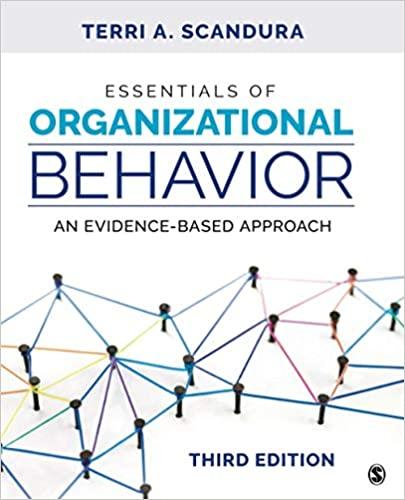With the research on twins reared apart and evidence from the Big Five personality theory relating personality
Question:
With the research on twins reared apart and evidence from the Big Five personality theory relating personality traits to leader emergence in groups, one question that arises is whether leaders are born to greatness or if leadership can be acquired by anyone. This is one of the most frequently asked questions about leadership and traits. There are arguments on both sides of this issue among scholars of organizational behavior. For example, research suggests genetic factors contribute as much as 40% to the explanation of transformational leadership. This suggests that much of charismatic, visionary leadership is an inborn trait. One leadership study compared genetic samples of approximately 4,000 employees with career information. They took DNA samples and then examined whether employees supervised other people in leadership roles. They learned that there was a significant association between genetics and leadership. On the other hand, many people believe that transformational leadership can be learned, and experimental research has shown that leaders can be trained to exhibit charismatic behaviors. Also, followers responded positively to leaders that have been trained, and their performance increased. An integrative perspective suggests that leaders have certain inborn traits that predispose them to self-select into leadership positions. For example, an employee who exhibits extraversion might be more likely to pursue a high-level position in an organization. Once hired into a leadership role, these people may respond to leadership training better than those who are not as interested in becoming leaders. The best thinking on this at present is that leadership is most likely a combination of inborn traits and learned behavior. Leadership expert Ron Riggio believes that leaders are mostly made. He estimates that leadership is about one-third born and two-thirds made. The implications for organizations are to carefully select those hired into leadership and then provide the training needed to enhance leader effectiveness. Those with innate leadership skills have an advantage, but an individual may be able to enhance their leadership capabilities by learning about the behaviors that comprise effective leadership and then practicing the behavioral skills needed.............
Discussion Questions
1. In your opinion, is leadership innate (hereditary) or learned (through training, for example)? Support your position.
2. If leadership is both innate and learned, as some researchers believe, what do you think is the best way to identify leadership potential?
3. What type of leadership training would you recommend to complement the selection process?
Step by Step Answer:

Essentials Of Organizational Behavior An Evidence-Based Approach
ISBN: 9781544396781
3rd Edition
Authors: Terri A. Scandura





